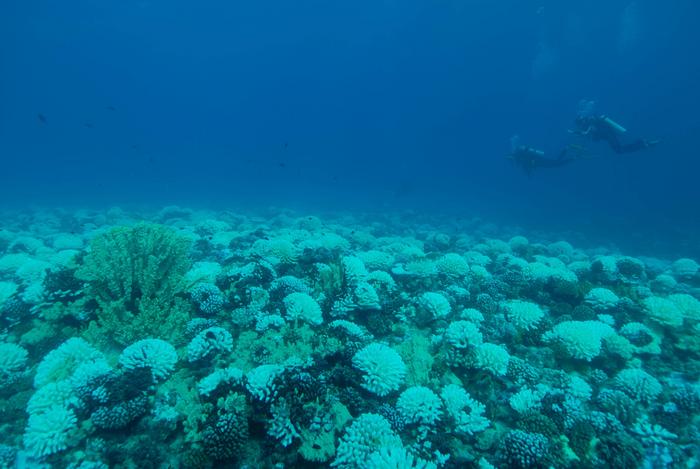On healthy reefs around the world, corals, algae, fishes and microbes live interconnected and in balance—exchanging nutrients, resources, and chemical signals. New research led by the University of Hawai‘i (UH) at Mānoa and and the Royal Netherlands Institute for Sea Research (NIOZ) revealed that when coral bleaching occurs, corals release unique organic compounds into the surrounding water that not only promote bacterial growth overall, but select for opportunistic bacteria that may further stress reefs.

Credit: Milou Arts of NIOZ
On healthy reefs around the world, corals, algae, fishes and microbes live interconnected and in balance—exchanging nutrients, resources, and chemical signals. New research led by the University of Hawai‘i (UH) at Mānoa and and the Royal Netherlands Institute for Sea Research (NIOZ) revealed that when coral bleaching occurs, corals release unique organic compounds into the surrounding water that not only promote bacterial growth overall, but select for opportunistic bacteria that may further stress reefs.
“Our results demonstrate how the impacts of both short-term thermal stress and long-term bleaching may extend beyond coral and into the water column,” said Wesley Sparagon, co-lead author, postdoctoral researcher in the UH Mānoa College of Tropical Agriculture and Human Resources and previous doctoral student with the UH Mānoa School of Ocean and Earth Science and Technology (SOEST).
The research team, which included scientists from UH Mānoa, NIOZ, Scripps Institution of Oceanography and University of California, Santa Barbara, conducted experiments on bleached and unbleached corals gathered during a bleaching event in Moorea, French Polynesia in 2019.
“Although coral bleaching is a well-documented and increasingly widespread phenomenon in reefs across the globe, there has been relatively little research on the implications for reef water column microbiology and biogeochemistry,” said Craig Nelson, senior author on the study and professor in SOEST.
In a heating experiment, the team determined that both thermally stressed and bleached coral exude a different composition of organic matter in response to thermal stress as compared to unbleached coral. These unique compounds fed microbial communities in the surrounding water, causing an increase in their abundance.
“Interestingly, the microbes responding to bleaching coral exudates were distinct from those grown on healthy coral exudates,” said Sparagon. “And, there were higher abundances of fast-growing opportunists and potential pathogens. The growth of these microbial communities around stressed corals may harm corals, either through suffocation or by introducing disease.”
The biggest surprise was that this shift in the compounds coral release occurred in coral that experienced any stress in the study: corals that had been warmed but not bleached yet, corals that were both heated and bleached, and corals that had bleached previously in the field.
“This suggests that this process occurs throughout the period of coral bleaching, from onset of thermal stress all the way through recovery,” said Milou Arts, co-lead author of NIOZ. “Importantly, it is most pronounced in healthy corals under thermal stress, suggesting that it is most influential at the onset of thermal stress and may push corals towards more severe bleaching and ultimately, mortality.”
The researchers are now actively working on identifying compounds and microbes in the water column that serve as an early-warning system for coral reefs under stress. This could enhance or complement other coral reef conservation efforts, especially in terms of identifying coral reef stress before catastrophic damage has occurred.
Journal
Communications Biology
DOI
10.1038/s42003-023-05730-0
Method of Research
Observational study
Article Title
Coral thermal stress and bleaching enrich and restructure reef microbial communities via altered organic matter exudation
Article Publication Date
13-Feb-2024
COI Statement
The authors declare no competing interests.




